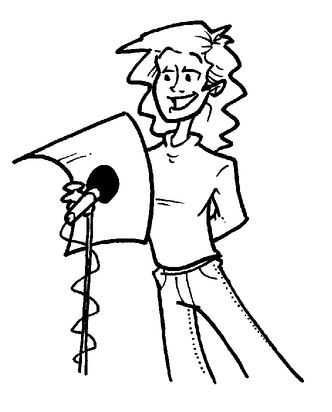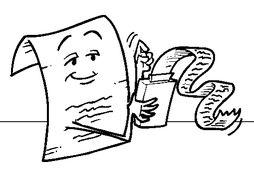
Chapter 18
To Slam or Not To Slam?: Reading Your Poetry in Public
In This Chapter
➤ Why read poems in public?
➤ Where to read your poems
➤ What to expect at a reading
➤ The short-course on slamming
➤ Starting your own reading series
The history of poetry includes a long period of time when poetry wasn’t a written art, but an oral one. Poets were the historians of the tribe, passing down legends and stories for future generations. This is poetry’s legacy, rooted deeply in the spoken word. As we’ve seen, poetry has its roots in song, chant, and ritual—all forms of poetry meant to be heard.
Poetry needs an audience. Part of the art includes creating and sharing. Sure, you could publish a book (if you’re very patient, a great writer, and believe in Lady Fortune), but reading your poetry in public is far easier and is a gift granted to you more often than publication. You’ll find that many opportunities are popping up all around the country; all you have to do is find one and show up.
This chapter will help you to get over the fear of reading in public and offer you tips on making your performance the best it can be.
Why Should I Read Poetry in Public?
You should read in public to share your work with others and to contribute to poetry’s oral tradition. Only after you’ve faced an audience can you really know what your poetic ancestors did for the art. Ultimately, you should read your poems in public because you want to. No one’s forcing you. But I can tell you that it’s a lot of fun.

Poetically Correct
Open mic is a reading where anyone from the audience is invited to read his or her poetry.
When you read your poems in public, you get feedback that you won’t get in a workshop (or sitting alone in your room), most of it positive. You’ll meet other people who love and write poetry, especially if you become a regular at a particular open mic, which is the term for a reading where anyone from the audience is free to read his or her poetry.
Reading your work aloud in front of an audience (no matter how small the audience is) can also help your writing. You will begin to hear where your poems may need tweaking in their line breaks and musical elements. If your tongue trips over a line again and again, it probably should be changed. If you’re breathless after reading a particular poem, perhaps you need to add some punctuation or break the lines differently.
Where to Read
If you’re in a big city like New York or San Francisco, you’re in luck—poetry readings are plentiful. If you live in a college town, it shouldn’t be difficult to find them either. If you make your home in a more rural area, you might have to travel a bit and do some research to find a reading or a regularly scheduled reading series near you.
Most bookstores offer open mics or scheduled readings. Call around to find out when they are held. Call your local university’s English or creative writing department as well; they’re bound to have a reading series. Most colleges also have a poetry society, a couple of poetry journals, and a cultural society, all of which may offer reading series or open mics.
Some cities celebrate National Poetry Month in April with a variety of poetry events. You are bound to find dozens of readings at that time. Keep an eye on the local newspaper around April to see if they list readings. This is a good time to begin making contacts.
What to Expect at a Reading
Poetry readings are usually small affairs, with the exception of those of the “famous” poets, usually highly published prizewinners who draw decent-sized crowds. I’ve seen open mics with as few as 6 people in the audience and as many as 40. Remember, you’re not going to get famous doing this, but you will have fun. Even if only six people are in the crowd, and they’re all your siblings, read anyway. Be a good sport. Remember, any type of reading is good practice, even if everyone in the audience is related to you (or sleeping).
Most reading locations offer a microphone so you won’t have to shout your poems, but some rooms are small enough that you won’t need one. Hearing yourself the first few times over the mic is uncanny; however, realize that you sound normal to your audience, so just pretend that you can’t hear your own voice, strange as your poems sound to you reverberating over the speakers.
If you’re at an open reading, it’s likely that other people will be reading their poetry as well. A sign-up sheet will probably be at the front. If you don’t want to go first you can try to sign your name below the others, but that doesn’t always work, as some MCs will choose from the list at random.
You might find a lot of distractions at a reading, especially if it’s at a commercial establishment like a bookstore, coffee shop, or bar. For one, a cash register is bound to be ching-chinging away; most places host readings in the hopes of bringing customers in, so you can’t blame them. There might also be a phone ringing, uninterested customers walking in and out, and people talking. In cases like this, try to have some poise. The people who want to listen will make every effort to hear you.
Audience Etiquette
Being a member of an audience at a poetry reading comes with certain rules. Here are some basic guidelines:
1. Don’t talk while another poet is reading; that’s just plain rude.
2. No heckling, unless you’re at a slam (we’ll get to that in a bit).
3. If you have to get up to use the restroom or buy a grande skim mocha latte, wait until the reader has finished, or at least until a pause between poems.


Touchstones
All poets who, when reading from their own works, experience a choked feeling, are major. For that matter, all poets who read from their own works are major, whether they choke or not.
—E. B. White

Roses Are Red
Readings have no real dress code, but if you can dust off that old black beret, you’ll really fit the part. A black turtleneck is optional. Try to learn to enjoy coffee if you can—smoking is not obligatory these days.
4. If you must eat, do so with as little noise as possible, and avoid the rustling of wrappers.
5. You don’t need to applaud after each poem unless it was such a show-stopper that the rest of the audience breaks into applause as well. Clapping after the poet has finished is traditional.
6. If you liked the poet’s work, it’s great to go up to them and say so—but don’t use this time to critique their poems.
Reader Etiquette
You, as a reader, have some protocol to follow as well. Here are some tips to make your reading go smoothly:

Dodging Doggerel
Don’t explain your poems thoroughly before you read each one. Expect that your audience is there to hear poetry, not to hear a summary of your poems. If you feel that a few of your poems need a bit of explanation, do so briefly. Better to read more poems in the time allotted than ramble on about how and why you wrote them.
1. If you have time, begin your reading with another poet’s work, a poem that you really admire. I like beginning my readings like this, though you don’t have to. It’s simply a nice way of recognizing and sharing a poem you love and exposing it to others.
2. Thank your audience for coming before you begin.
3. Read to your time limit (find out what it is before you read) and don’t go over—that takes time away from other poets.
4. Read slowly, clearly, and pause a moment between poems. A little chatter doesn’t hurt, but you should be spending your time reading your poems rather than talking about them.
5. To indicate line breaks, hesitate slightly at the end of each line. This hesitation is usually equivalent to the duration of half a comma.
6. Don’t apologize for your work. Have confidence, even if you have to pretend to have it.
7. When you’re done reading, thank your audience again.
Slamming and the Spoken Word
The “spoken word” forum and the poetry slam have become popular in recent years and have been the focus of a lot of media attention, including major motion pictures and MTV.
A poetry slam is a cross between a poetry reading and a gladiator competition with only metaphorical bloodshed. Poets get on stage and read a poem while judges chosen randomly from the audience score their poems. This might sound completely antithetical to the spirit of poetry, but this kind of competition actually has its roots in ancient Greek and Roman times.
According to the book Poetry Slam: The Competitive Art of Performance Poetry, by Gary Mex Glazner (Maniac D Press, 2000), the poetry slam began in earnest around 1986 in Chicago. In the next few years, poetry slams sprung up in larger cities around the country and, in 1990, Glazner produced the first-ever National Slam in San Francisco. National Slams have been produced every year since.

Roses Are Red
Practicing in front of a mirror may help to calm your nerves before a reading. Try out your jokes between poems, time your reading, and shuffle the order of your poems to hear how they work best.

Let Me Count the Ways
I moved to New York City during the heyday of the poetry slam at the Nuyorican Poetry Café on 3rd Street between Avenues B and C. I became enamored with the energy and feeling of the place, and found myself attending or participating in slams almost every week. This is where I discovered that I’m a poet of the written word—I never came in above fourth place, and, in fact, came in dead last once—the MC quipped that if the slam was golf, I’d be winning. One of the mottos of the poetry slam is “The best poet always loses.” I think they say it so that the ultimate loser doesn’t feel too badly about being squashed, but I’m going to believe it anyway!
What Is Spoken Word?
Spoken word is a form of poetry that’s written to be read aloud. Because it is meant for an audience of listeners, spoken-word poems often contain a predominance of musical elements (repetition, rhyme, alliteration, etc.) and may even call for foot stomping, hand clapping, singing, or other physical elements that add emphasis to the poem.
Spoken-word poems tend not to work as well on the page as they do read aloud, though that’s not necessarily the case. The spoken-word poet is concerned largely with the oral quality of the poem and how the audience will receive it—a slam is, after all, a competition.
Subject matter for spoken-word poems tend to be highly personal or political, often using material that will titillate the audience. The poems are largely narrative, telling a story that the audience (and the judges) will have some kind of reaction to.
How a Slam Works
The “slam open” is for anyone who wants to participate and try for a chance to move up to the invitational slam (made up of the winners of the slam open), the participants of which may move up to the semifinals, the finals, the Grand Slam, and ultimately, the National Slam. At the slam open, poets read one poem in round one that they hope will get them into round two. Poets who don’t make it into round two have to come back the following week if they want another chance.
Before the slam begins, the MC will choose judges at random from the audience. These judges need not be versed in poetry; they just have to be willing to judge, which can be a harrowing experience if you judge an audience-favorite poet or poem too low. Judging is from 0 (low score) to 10 (high score), and uses decimal points so that there’s less of a chance of a tie.
Poems are judged on content and performance, but mainly on performance, in my experience. Often there’s a poet who’s “famous” at the slam, one who is loved by the audience, and this poet tends to win frequently.
Poets who read first are at a disadvantage; the crowd is not warmed up yet (not tipsy enough, in some cases) and tends to score the first few slammers lower than they would have later in the evening. If you can help it, jockey for a reading position as late in the slam as possible, when the scores tend to be higher.
While this might sound like very serious stuff—and it is for many of the poets—the slam is downright fun. People are hyped up to hear great poems, and there’s a lot of laughter, general silliness, heckling, and the occasional very powerful poem. Even if you don’t have the guts to participate (and it does take some courage), try to attend a slam—you’ll get a real kick out of it.

Let Me Count the Ways
Rules for The National Poetry Slam (from the book Poetry Slam: The Competitive Art of Performance Poetry, by Gary Mex Glazner):
1. The three-minute rule: Poems must be read in three minutes or less.
2. The no-prop-or-costumes rule: No props or costumes may be used.
3. The who-wrote-the-poem rule: Each poet must have written the poem he or she performs.
4. Scoring poems: At the Nationals, five judges each score the poems from 0 to 10, with 10 being the highest possible score.
For complete rules, refer to the book listed above or go to www.poetryslam.com and request the full set of rules.
Writing for Listeners
Part of reading your poetry aloud involves considering how the audience will react to your poem. You are not the ruler of the room just because you’re at the mic; when you read your poems aloud, you are making a transaction with the audience. You’re giving them something, hopefully in the best possible form, and they’re giving your poems their attention and appreciation. Many performance poets understand the need to connect with the audience. They are experienced in writing for and handling an audience. Here’s a poem that includes sounds beyond the written words. Try to imagine what it would sound like aloud:
The Sound of Metal
For the Sailors of the submarine Kursk
(symbols are to be performed as Morse code)
(symbols are to be performed as Morse code)

The sound of metal ringing in the sea.
A map to speak of possibility.
Concentric tones of need.
A rhythm charged with want.
Where does it come from?
A steel pulse calling
rising to the surface
clinging to any ear.
Reaching up an atlas of why.
What language is this?
How to explain the density of air?
This is the speech of ocean.
This is the breath you are not taking.
Calling out—free us. Calling out—find us.
We are not hidden.
We are simple sailors,
Won’t you gossip about survival?
He has always loved swimming in the river
and it was impossible to pull him out of there.
We know that they are still alive,
because they knock on the walls.
Carbon Dioxide hatches every dream exhaled.
The absolute truth of lungs.
The fierce work of depth-charge.
Claustrophobic frontier.
This foul moment of union.
We are listening.
They are banging an alarm of devotion.
They tell us who to wait for.
A multitude of pounding.
The drum composed of life.
An instrument of clarity.
Singing of consummation.
A bell clinging to the shape of its chime.
Sound quick as water.
Tone thicker than time.
A tapping faint as forget.
Buoyant into the fracture.
Floating up like prayers.
A map to speak of possibility.
Concentric tones of need.
A rhythm charged with want.
Where does it come from?
A steel pulse calling
rising to the surface
clinging to any ear.
Reaching up an atlas of why.
What language is this?
How to explain the density of air?
This is the speech of ocean.
This is the breath you are not taking.
Calling out—free us. Calling out—find us.
We are not hidden.
We are simple sailors,
Won’t you gossip about survival?
He has always loved swimming in the river
and it was impossible to pull him out of there.
We know that they are still alive,
because they knock on the walls.
Carbon Dioxide hatches every dream exhaled.
The absolute truth of lungs.
The fierce work of depth-charge.
Claustrophobic frontier.
This foul moment of union.
We are listening.
They are banging an alarm of devotion.
They tell us who to wait for.
A multitude of pounding.
The drum composed of life.
An instrument of clarity.
Singing of consummation.
A bell clinging to the shape of its chime.
Sound quick as water.
Tone thicker than time.
A tapping faint as forget.
Buoyant into the fracture.
Floating up like prayers.

—Gary Mex Glazner
You can see that the poet here used Morse code as a part of his poem—directions to the reader are just after the title. I imagine that the code could be stomped or played on two metal sticks, or rendered any other creative way the poet has in mind. Also notice that almost every line is end-stopped, creating a dramatic effect when read aloud. You can use these kinds of effects in your poems, too. I have a poem that uses a bit of dialogue and every time I read it aloud in front of an audience I use voices for the three different characters—this always gets a laugh and people pay more attention to the rest of the poem.

Roses Are Red
Record yourself doing a practice reading to hear how you sound to an audience. Realize that when you play the recording back, you are far more critical of your voice (and of your poems) than is the audience. You’ll want to listen for your reading “style.” Do you have long pauses between poems? Do you explain too much? Do you consistently trip over lines? Hearing yourself may help you to smooth out your performance.
Starting a Reading Series or a Slam
If you can’t find a reading series, open mic, or slam near you, or you feel that your community could use another one, consider starting one yourself. You can approach coffee shops, bars, and bookstores for the space, most of which will be happy to comply if you can promise them some new customers.

Roses Are Red
Before you read your poetry in public or before you compete in a slam, go to several readings and slams and just listen. Try to get a feeling of the room, the audience, and the amount of time you have to read.
Advertise in the local paper, make up flyers, and contact your local radio stations for some free press. If you can offer something like free coffee or cookies for the first few readings, you might find yourself with some loyal attendees. Though they might be the homeless people who live in cardboard boxes near the coffee shop, they may turn out to be the best poets attending!
If you start your own series, you can invite published poets to read, and have your open mic after the reading—that way you will have a built-in audience for the open mic. Starting a series is one way to begin to create a little press for yourself in your poetry community—but remember, it’s all about the poetry, first and foremost.
Exercises
Here are some ideas to get your poetry floating on the air. Have courage—get out there and read!
➤ Call your local university and write down the dates of some upcoming poetry readings. Try to attend at least one.
➤ Practice reading some of your poems in front of the mirror. How do they sound to you? Choose the five best-sounding poems and take them to an open mic, even if you don’t plan to read.
➤ Read your poems at an open mic. Come on: Get brave!
➤ Attend a slam. You may have to go to New York, San Francisco, Portland, or another city to do it! Pack the car, kids—we’re going to the Big Apple!
The Least You Need to Know
➤ Reading your poems in public can actually help you write.
➤ Poetry readings are usually small affairs, but you should read anyway—even if the audience is made up entirely of your family.
➤ Spoken word is a form of poetry that’s written to be read aloud.
➤ The poetry slam is a kind of poetry competition where poems are judged on their performance as well as content.
➤ If you have no reading series in your area, begin your own!
..................Content has been hidden....................
You can't read the all page of ebook, please click here login for view all page.
